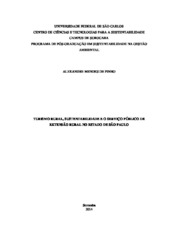Turismo rural, sustentabilidade e o serviço público de extensão rural no estado de São Paulo
Resumo
The contemporary extension comes across a rural area into new ruralities, including the inclusion of tourism, which can make allowance for the reorientation of its technical extension to new practices. The All-purpose Technical Assistance Coordination (from Portuguese, Coordenadoria de Assistência Técnica Integral CATI), an entity in which the act constituting the extension agents of this study, is the organ of the State Department of Agriculture and Food Supply responsible for actions of public extension with rural producers in the State of São Paulo. The absence of an institutional project focused on the rural tourism constituted motivation to gather aspects of care of the extension of CATI demand producers in this area as well as it realizes that there is a concern with a tour that is developed in a more sustainable way. In this sense, the goal of this dissertation was to survey elements on the perception of extension agents to justify the construction of an institutional program covering training activities and planning that will encourage them to expand their awareness and critical review of rural tourism phenomenon as a development vector. The research constituted of a recess, within the set of 645 municipalities of São Paulo, which considered those with rural tourism as prominent activity from two different criteria, resulting in a sample of 87 municipalities. To collect the data we used a questionnaire that sought, in the opinion of extension working with producers in the sampled counties, its profile and it characterizes its performance under rural tourism as well as to know their perception of the importance of the work of this extension segment and on sustainability elements related to tourism. From the collected data it was noted that, in general, the technical team acknowledges the role of the extension service in the context of rural tourism, as well as under the point of view of the development of economic activity, as the role of articulation and mediation that can be assumed by extension. However, this research pointed to some limitations that need to be overcome, namely: motivational issues, partly caused by the lack of incentives from the institution to standardize and to enhance the standard of care demands of tourism; the lack of specific technical knowledge on tourism; the need to increase their knowledge beyond environmental approach in the context of sustainable tourism development, with the expectation aid in understanding the strengths inherent to the phenomenon of tourism conflicts. Accordingly, an investment in differentiated capabilities would be essential in building a CATI statewide program, guided to the qualifying holding its extension agents in the context of rural tourism process.
Collections
Itens relacionados
Apresentado os itens relacionados pelo título, autor e assunto.
-
Diálogos digitais: as organizações brasileiras de Ater na internet em tempos de pandemia
Darcie, Carolina (Universidade Federal de São Carlos, UFSCar, Programa de Pós-Graduação em Ciência, Tecnologia e Sociedade - PPGCTS, Câmpus São Carlos, 19/08/2022)This dissertation explores the different paths, content and forms of digital communication existing in public bodies of technical assistance and rural extension, during the pandemic of the new coronavirus 2020 and 2021. ... -
O ruralismo pedagógico no estado de São Paulo nas décadas de 1930 e 1940: as escolas normais, os cursos de especialização, as escolas técnicas e os clubes agrícolas
Basso, Jaqueline Daniela (Universidade Federal de São Carlos, UFSCar, Programa de Pós-Graduação em Educação - PPGE, Câmpus São Carlos, 27/02/2018)During the 1980s and 1940s were marked by the impact between those who defended the urbanization and industrialization of the countries, and the rural persons desired the maintenance of the agrarian economy and the power ... -
A implementação da chamada pública de Ater agroecológica no Vale do Ribeira (PR): desafios e viabilidade
Silva, Kessy Rizental da (Universidade Federal de São Carlos, UFSCar, Programa de Pós-Graduação em Agroecologia e Desenvolvimento Rural - PPGADR-Ar, Câmpus Araras, 24/02/2017)Rural development in Brazil has been marked by concern not only with issues related to income generation, but also with improvements in the living conditions of rural populations. Rural Extension can be configured as a ...
